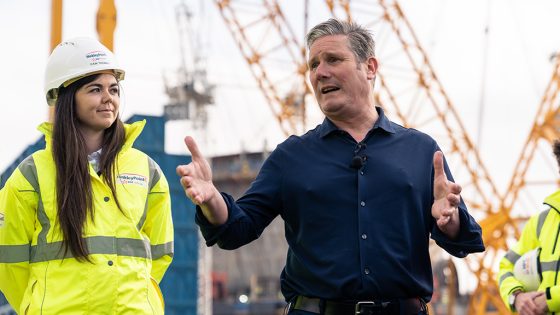Labour has almost halved its green investment plan for the next parliament.
The opposition party, which has a large lead in opinion polls with a general election due to be held within the next 11 months, previously made a flagship commitment to a £28bn annual “green prosperity plan”.
The plan for investment in schemes including hydrogen, carbon capture, steel, ports, gigafactories and home insulation has been cut to £15bn per year.
Labour’s commitment to insulating 19 million homes over a decade has been reduced to a pledge to insulate five million by 2030.
Writing in the Guardian, party leader Sir Keir Starmer and shadow chancellor Rachel Reeves said: “The plan will be funded through a proper windfall tax on oil and gas giants, and – like responsible governments and successful businesses around the world – through borrowing to invest so we can invest to grow.”
They added: “In the two years or so since we first announced the green prosperity plan, the circumstances have changed.
“None of us could have predicted the damage the Conservatives would do when they crashed the economy. The aftershocks of the disastrous mini-budget are still being felt. [Prime minister] Rishi Sunak and [chancellor] Jeremy Hunt have not learned from those mistakes.
“It is not the inheritance we would have chosen, but it is the inheritance we will face if we are elected. It means we will not be able to announce additional investments under the green prosperity plan.”
The pair said spending would not reach £28bn in the next parliament and that economic growth would be “the number one mission” if Labour won the election.
Other Labour commitments include setting up a public company called Great British Energy that would help deliver low-carbon energy.
The UK Green Building Council criticised the “short-sighted political manoeuvre”.
Deputy chief executive Simon McWhirter said: “Stimulating our green economy with clear, robust policy commitments is the most fiscally prudent and economically beneficial strategy for tackling the UK’s most chronic problems, including energy security, cost of living, long-term health and social challenges, and climate breakdown.
“Political leaders must recognise the green economy for the transformative opportunity it is instead of mischaracterising it as an unaffordable luxury. This is mission-critical for our country, our people and our planet.”
Sunak said the move showed that Starmer “confirms he doesn’t have a plan for Britain”.
He added: “His pledge has a £28bn price tag and now he’s admitted there’s no plan to pay for it, which means going back to square one with higher taxes for working people. That’s why we need to stick with our plan that’s working.”
Sunak’s government itself pushed back its net-zero goals on home insulation, boiler replacement and electric cars last September.

